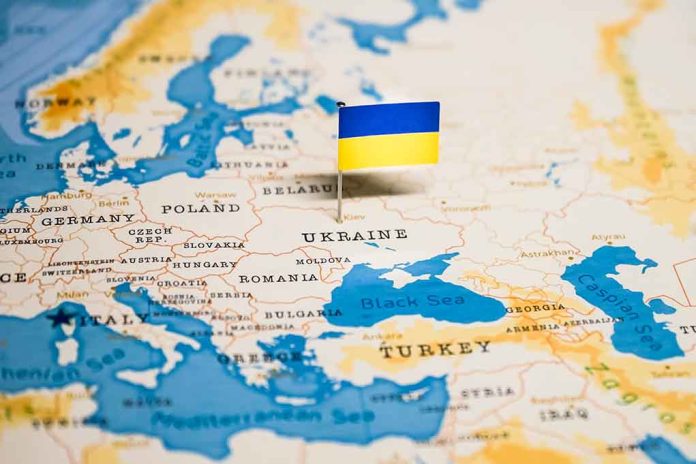
Ukrainian President Volodymyr Zelenskyy has once again declared that Ukraine will never surrender its annexed territories to Russia, a stance that sharpens geopolitical tensions in an already complex and dynamic conflict situation.
Key Takeaways
- Zelenskyy affirmed Ukraine’s refusal to concede occupied territories to Russia.
- The war continues to have a significant human and economic toll on Ukraine.
- Western nations support Ukraine, providing military and diplomatic aid against Russian aggression.
- European leaders weigh the potential of forming a peacekeeping force in Ukraine.
- U.S. Special Envoy’s suggestion to recognize lost territories sparks outrage in Ukraine.
Ukraine’s Firm Stance on Annexed Territories
Volodymyr Zelenskyy, in an interview with *Le Figaro*, reiterated that Ukraine’s annexed territories will not be yielded to Russia. He emphasized utilizing diplomatic means to reclaim these areas in an effort to avoid further loss of life. Since the start of the Russian invasion in 2022, Moscow has taken control of regions including Donetsk, Luhansk, Kherson, Zaporizhzhia, and Crimea. Zelenskyy asserts, “One thing is certain: we will never cede our occupied territories to Russia. These lands belong to the Ukrainians.”
While European nations, in particular, rally behind Ukraine with military and diplomatic support, there are calls to deploy a peacekeeping force to further stabilize the region. Zelensky’s declarations have been met with approval from key European allies, continuing the demands for Russia to relinquish occupied areas.
Analyzing International Reactions and Challenges
Despite continued international backing, the challenges remain entrenched. A recent analysis by Mark Milley, former U.S. chairman of the Joint Chiefs of Staff, suggests that “victory is probably not achievable through military means,” casting doubt on the efficacy of continued armed conflict.
Diplomatic Endeavors and Leadership Dynamics
Compounding the complexity are concerns about diplomatic measures being influenced by U.S. President Donald Trump’s past relations with President Vladimir Putin. Zelenskyy expressed skepticism, suggesting that any easing of sanctions could be perceived as weakness by Russia: “Donald Trump tried to create good diplomatic relations with Russia. But this kind of method doesn’t work with a man like Putin.” Such statements underscore the delicate balance of leadership dynamics in ongoing peace talks.
Meanwhile, U.S. Special Envoy Steve Witkoff proposed acknowledging the loss of territories as a peace negotiation tactic, which has met with significant backlash from Ukraine. Such suggestions have amplified tensions, contributing to the discourse surrounding achievable peace strategies.
Path Forward Amidst Geopolitical Tensions
The static nature of the conflict, bordered by the potential spring offensive from Russia, adds another layer of urgency. Zelenskyy accused Russia of delaying ceasefire talks in pursuit of greater strategic gains, driving home the need for a robust peace agreement.
With global eyes fixated on this complex theater, leaders are urged to strategize beyond military maneuvers to address the geopolitical realities and influence key stakeholders can wield.
Sources:
- It’s Time for Ukraine to Accept an Ugly Peace
- Zelensky says Putin trying to drag out talks on Ukraine ceasefire to continue war – BBC News
- Zelensky Says Ukraine Will ‘Never Cede’ Occupied Territories to Russia



